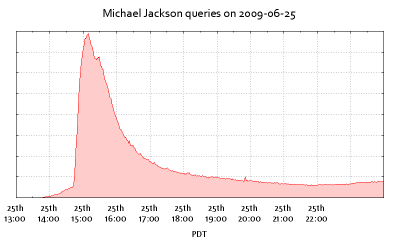The King (of Pop) is dead. But Jeff Goldblum is fine.
Saturday, June 27th, 2009OK, first a disclaimer and personal note: I don’t intend to minimize, ensnarkify, or otherwise make bones on the death of Michael Jackson. It will probably happen anyway, because I have the self control of a cracked-out hummingbird. Let me just say that, while I’d never have described myself as a fan, and Michael’s public image drifted past mockable and into pitiable a long time ago, he was a powerful force in music and entertainment. Starting with the Jackson 5, he brought some great music to the world. Thriller is still the top-selling album of all time. Oh, and could he dance—Sammy Davis Jr. and Fred Astaire (among a great many others) seriously admired Michael’s moves. Admit it, you used to try to Moonwalk because Michael did it. There’s more to Michael Jackson than I’ll ever know, and while parts of his life were unfortunate, ugly, and even self-destructive, I respect a great entertainer when I see one, and Michael qualifies.
The Internet nearly broke on June 25, 2009. It wasn’t hackers, EMP, sunspots, or an earthquake at a critical server farm. No, it was far, far worse.
The first I heard of the situation was from good friend and former office-mate Josh Weinberger (or @kitson to you Twitter addicts), who linked me celebrity gossip site TMZ’s report that Michael Jackson had died suddenly. The journalist in me expressed doubt, and I looked for confirmation; early reports from sources I considered more trustworthy said the 50-year-old pop icon had collapsed, been revived, and taken to a hospital, but the granular truth never became clear to me. Whatever the specifics, the King of Pop was dead, and bloggers and tweeters beat the major news sources to the story.
I’m not going to get into a fight over why a famous person’s death should become world news, especially when there’s so much else going on that could have a material effect on our lives. I’ll let Datamonitor analyst Ryan Joe’s Facebook status update sing that song.
There had already been two other celeb passings that week, but they didn’t make as big an impact. EdMcMahon was 86 and clearly slowing down (is it too soon to resume calling him Old McMan?), and Farrah Fawcett had terminal cancer, so to be blunt their passings were a matter of time.
Michael was a true surprise, and he seems to have had a much bigger and more vocal fan base. The sudden traffic spike brought browsers to a screeching halt; sources at Google said the surge in queries seemed like an attack.

Not Jacko's EKG, Google's.
As with any news of this sort, it gets worse. On the heels of the news of Michael’s death, rumors began to spread that Jeff Goldblum had fallen to his death while on a location shoot in New Zealand. Similar stories concerning Harrison Ford started circulating, then a number of other stars got the R.I.P. treatment.
Goldblum answered back with the only force more powerful than a twitterstorm: the Colbert Report.
Whenever a famous person of any magnitude is reported dead and there’s no reason to expect it, one will always be well-served to check the rumor to make sure it isn’t complete bullshit. The fact that the (confirmed) deaths of pitchman Billy Mays and impressionist-comic Fred Travalena barely made a ripple can be attributed as much to the sudden skepticism caused by the hoaxes as to the relative dimness of their stars. (Sorry guys, but anybody who thinks either of these fellows is on the same tier as those I’ve just mentioned has been watching way too many infomercials and ’70s reruns.)
Twitter is a powerful force because of its immediacy, but also because the 140-character limit means that details are lost or ignored—only the headline gets picked up, and lies can spread as fast as truth. On the one hand, I’m glad that somebody (an asshole, but somebody) decided to inject a little perspective into the rumor mill, and remind us that crowdsourced =/= accurate. On the other hand, such a demonstration could weaken or slow the adoption of social media, and that would be something else to mourn.
 RSS Feed
RSS Feed